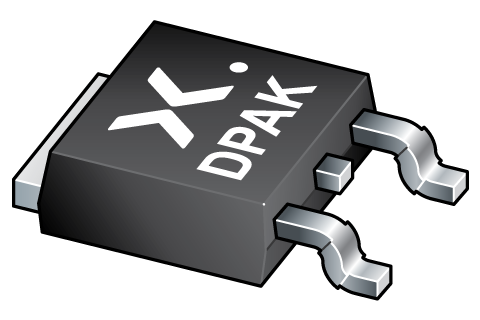
Register once, drag and drop ECAD models into your CAD tool and speed up your design.
Click here for more informationBUK138-50DL
Logic level TOPFET D-PAK version of BUK117-50DL
Monolithic temperature and overload protected logic level power MOSFET in TOPFET2technology assembled in a 3 pin surface mount plastic package.
Features and benefits
- TrenchMOS output stage
- Current limiting
- Overload protection
- Overtemperature protection
- Protection latched reset by input
- 5 V logic compatible input level
- Control of output stage and supply of overload protection circuits derived from input
- Low operating input current permits direct drive by micro-controller
- ESD protection on all pins
- Overvoltage clamping for turn off of inductive loads
Applications
General purpose switch for driving
- lamps
- motors
- solenoids
- heaters
in automotive systems and other applications.
Parametrics
| Type number | Package version | Package name | Product status | Release date |
|---|---|---|---|---|
| BUK138-50DL | SOT428 | DPAK | End of life | 2011-01-18 |
Package
All type numbers in the table below are discontinued.
| Type number | Orderable part number, (Ordering code (12NC)) | Status | Marking | Package | Package information | Reflow-/Wave soldering | Packing |
|---|---|---|---|---|---|---|---|
| BUK138-50DL | BUK138-50DL,118 (934056344118) |
Obsolete | BUK138 50DL Batch No. P**XXYY AZ |

DPAK (SOT428) |
SOT428 |
REFLOW_BG-BD-1
WAVE_BG-BD-1 |
SOT428_118 |
| BUK138-50DL/C,118 (934060719118) |
Obsolete | BUK138 50DL Batch No. P**XXYY AZ | SOT428_118 |
Environmental information
All type numbers in the table below are discontinued.
| Type number | Orderable part number | Chemical content | RoHS | RHF-indicator |
|---|---|---|---|---|
| BUK138-50DL | BUK138-50DL,118 | BUK138-50DL |
|
|
| BUK138-50DL | BUK138-50DL/C,118 | BUK138-50DL |
|
|
Documentation (19)
| File name | Title | Type | Date |
|---|---|---|---|
| BUK138-50DL | Logic level TOPFET D-PAK version of BUK117-50DL | Data sheet | 2001-04-30 |
| AN10273 | Power MOSFET single-shot and repetitive avalanche ruggedness rating | Application note | 2022-06-20 |
| AN10874_ZH | LFPAK MOSFET thermal design guide, Chinese version | Application note | 2020-04-30 |
| AN11113_ZH | LFPAK MOSFET thermal design guide - Part 2 | Application note | 2020-04-30 |
| AN11156 | Using Power MOSFET Zth Curves | Application note | 2021-01-04 |
| AN11158 | Understanding power MOSFET data sheet parameters | Application note | 2025-02-18 |
| AN11158_ZH | Understanding power MOSFET data sheet parameters | Application note | 2021-01-04 |
| AN11160 | Designing RC Snubbers | Application note | 2024-10-21 |
| AN11243 | Failure signature of Electrical Overstress on Power MOSFETs | Application note | 2025-03-20 |
| AN11261 | RC Thermal Models | Application note | 2021-03-18 |
| AN11599 | Using power MOSFETs in parallel | Application note | 2016-07-13 |
| AN90063 | Questions about package outline drawings | Application note | 2025-03-12 |
| SOT428 | 3D model for products with SOT428 package | Design support | 2017-06-30 |
| Nexperia_package_poster | Nexperia package poster | Leaflet | 2020-05-15 |
| DPAK_SOT428_mk | plastic, single-ended surface-mounted package (DPAK); 3 leads; 2.285 mm pitch; 6 mm x 6.6 mm x 2.3 mm body | Marcom graphics | 2017-01-28 |
| SOT428 | plastic, single-ended surface-mounted package (DPAK); 3 leads; 2.285 mm pitch; 6 mm x 6.6 mm x 2.3 mm body | Package information | 2022-05-20 |
| REFLOW_BG-BD-1 | Reflow soldering profile | Reflow soldering | 2021-04-06 |
| TN00008 | Power MOSFET frequently asked questions and answers | Technical note | 2024-08-09 |
| WAVE_BG-BD-1 | Wave soldering profile | Wave soldering | 2021-09-08 |
Support
If you are in need of design/technical support, let us know and fill in the answer form we'll get back to you shortly.
Longevity
The Nexperia Longevity Program is aimed to provide our customers information from time to time about the expected time that our products can be ordered. The NLP is reviewed and updated regularly by our Executive Management Team. View our longevity program here.
Models
| File name | Title | Type | Date |
|---|---|---|---|
| SOT428 | 3D model for products with SOT428 package | Design support | 2017-06-30 |
How does it work?
The interactive datasheets are based on the Nexperia MOSFET precision electrothermal models. With our interactive datasheets you can simply specify your own conditions interactively. Start by changing the values of the conditions. You can do this by using the sliders in the condition fields. By dragging the sliders you will see how the MOSFET will perform at the new conditions set.